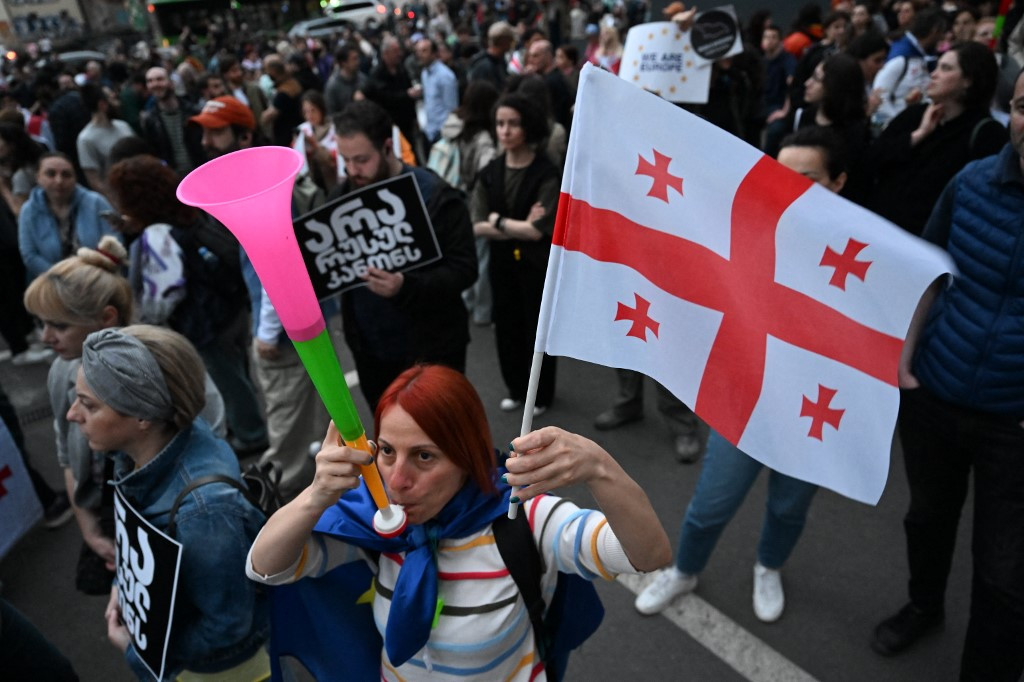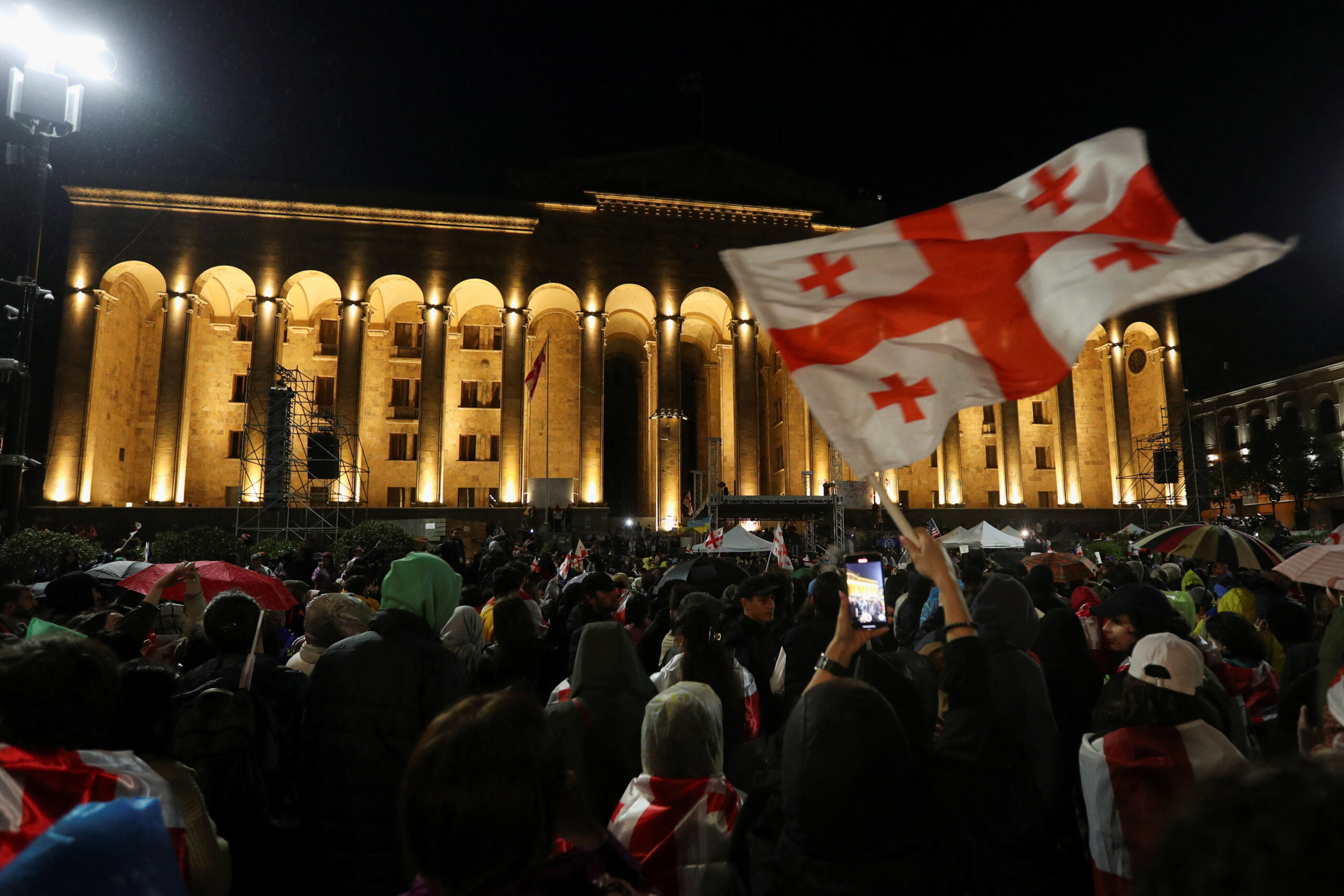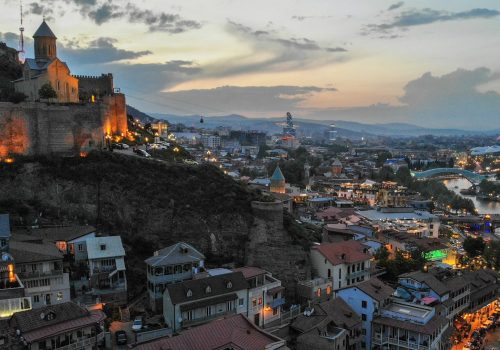Georgia
Georgia torn between the EU and Russia

Mass protests against the adoption of a “foreign agent” law, which stipulates that media and organisations that receive more than 20 percent of their funding from abroad must disclose their income, are gaining momentum in Georgia. In March 2023, protests against a similar bill ultimately led to its withdrawal. What to make of the current developments – not least in light of Georgia’s recently acquired EU candidate status?
Decide between East or West
Postimees sees the country at a crossroads:
“In December Georgia was granted EU accession candidate status, which requires compliance with certain values. These values certainly do not include brutally dispersing peaceful demonstrators using tear gas and rubber truncheons. Georgia should be aware that Russia currently views the EU as a hostile community, which means that Georgia’s status as a candidate country is viewed with hostility in Moscow. If Georgia really wants to join, it must free itself from undemocratic values, orient itself clearly towards the West and work seriously on reforming the country.”
Against the opposition and Europe
The general direction is clear, La Stampa laments:
“At a rally, oligarch Bidzina Ivanishvili – former prime minister and true power behind the ruling party – called for the ‘final judgement’ on the opposition, which he accuses of being ‘foreign agents’ of the ‘global war party EU-Nato’ who are ‘preparing the revolution’ in the run-up to the October elections. … Never before has the intention to bring Tbilisi back under the wing of Moscow, which grabbed a fifth of the country’s territory in 2008, been formulated more clearly. … This signal was also heard in Brussels. The European Parliament discussed imposing sanctions on Ivanishvili and suspending the accession process for Tbilisi. … But that would only pave the way for Ivanishvili.”
Other Topics of Interest
Post-Soviet Georgia in 10 Dates
The former Soviet republic of Georgia has been rocked by mass protests over a Russian-style “foreign agent” bill that targets foreign-backed NGOs.
Brussels must not turn away
The EU must not overreact, La Croix warns:
“The Europeans face a balancing act. The adoption of such a law can only prompt them to postpone the start of accession negotiations indefinitely. … But seeing thousands of demonstrators waving European flags in front of parliament to the strains of the Ode to Joy despite tear gas and water cannons cannot leave the member states unmoved. So slamming the door is not an option. Despite the risks and despite the pressure from Moscow, the Europeans, who are the country’s biggest donors, must continue to support the pro-democracy ambitions. Especially in the run-up to the Georgian parliamentary elections scheduled for October.”
A risk for the government
The Western orientation of Georgian society could slow down the government, hvg contends:
“The displeasure of the West and the ongoing opposition protests could force the government to back down again. After all, EU and Nato membership are very popular among Georgians – polls show that 80 percent of the population support Euro-Atlantic integration. So a worsening of the dispute between Brussels and Tbilisi could end up reducing the number of supporters of the ruling coalition.”
The pendulum of history could swing back
Ukraine should also learn a lesson from the latest developments in Georgia, writes political scientist Maksym Yali on Facebook:
“The events in Georgia show that even after military aggression it’s possible to relapse into the past, with forces coming to power that are, to put it mildly, neutral towards Russia. And they come to power quite legally, by the way. Okay, during Russia’s military invasion [in Georgia] there weren’t as many victims or as much destruction as in Ukraine. But it is still possible that the pendulum of history will swing back. Even though this seemed impossible in 2008. The Kremlin is hoping the same thing will happen in Ukraine.”
Moscow using same tactics as in Moldova
Russia continues to meddle in its former sphere of influence, political scientist Denis Cenusa observes on Contributors:
“In both Georgia and Moldova, Russia is trying to weaken the EU’s position and (re)gain strategic advantages by exploiting the mistakes made by the governments in their endeavours to remain in power. … For example, the introduction of legal mechanisms to obstruct civil society in Georgia, or the disproportionate reactions of the government in Chișinău against socially disadvantaged groups recruited by pro-Russian forces for political intrigues may poison the European agenda. The disunity in these countries serves Russian interests and could further complicate the EU’s eastward enlargement.”
Russia as a deterrent
In a post on Facebook, Russian opposition politician Elvira Vikhareva explains why the bill is so controversial:
“The ruling party Georgian Dream wants NGOs and media that receive more than 20 percent of their funding from abroad to register as ‘organisations representing foreign interests’. That’s the official wording. … It seems like a small thing, doesn’t it? But we remember very well what such a small thing led to in our country. The Georgians look across the border and understand everything. And of course there are hardly any media or NGOs in Georgia without this 20 percent. The country is very poor, it lives only on being open to the world and foreign funding, especially in the tertiary sector.”
The people will have their say in the autumn
Georgia has only been a candidate for EU membership since December, the Süddeutsche Zeitung points out:
“But instead of moving closer, it is already moving further away. … Tens of thousands are protesting because they see the proposed law as a threat to the country’s European course. … The words of the most powerful man in the country also give the people good reason to be sceptical. Bidzina Ivanishvili, billionaire, former prime minister and leader of the ruling party, has now launched a massive attack on the West. He claims the West wants to use Georgia, like Ukraine, as cannon fodder in the fight against Russia. This is completely untrue. Instead such words reinforce the impression of an increasingly authoritarian leadership that is unsure about pursuing the path towards the EU. It has the say. However, the Georgian people will also have their say in the parliamentary elections in the autumn.”
Even willing to jeopardise EU ties
The Georgian Dream party which has ruled the country for many years is under pressure now, observes Ukrainska Pravda:
“The most common explanation is that the law, which makes control over the public sector and independent media possible, is being used to secure victory in the parliamentary elections on 26 October. For the first time, these elections will be held without the single-mandate constituencies in which the ruling party has always won. That is why it will be more difficult for Georgian Dream to win this time round. … Retaining power (it should be remembered that Georgian Dream has been in power for almost 12 years) is the party’s key objective. And it is prepared to sacrifice even its ties to the EU to achieve this.”
It sounded harmless at first
Exiled TV-Rain journalist Ekaterina Kotrikadze warns on Facebook:
“Thanks to the Russian experience, people in Georgia understand very well where a ‘law on foreign agents’ leads and what it is needed for. Let me briefly recapitulate: The Russian state had promised us, too, that nothing terrible would happen, that the law would merely ensure ‘transparency’ and not prevent anyone from working or living in Russia. … There is not a single major independent media outlet or international human rights organisation left in Russia today. That was the aim of the Russian authorities when they claimed that the law on foreign agents was just a trifling matter.”

Georgia
Georgia 400 tolls: Express lanes proposed for busy state highway

Are tolls returning to GA-400?
A new proposal would see new tolls being put up along Georgia Highway 400, but it’s not how you think it would be.
ATLANTA – Tolls could make a comeback to Georgia 400. The Georgia Department of Transportation took a step closer to making toll lanes a reality on one of the busiest highways in metro Atlanta. The agency is looking at proposals to build the express lanes. GDOT says this will help ease congestion.
The agency is considering proposals from potential contractors to build the toll lanes. Under the proposal, which is still in the early stages, GDOT would build two new express lanes in each direction on a 16-mile stretch. These lanes would extend from the North Springs MARTA station at Exit 5C in Fulton County to McGinnis Ferry Road in Forsyth County, and one lane in each direction from McGinnis Ferry Road to McFarland Parkway at Exit 12.
“The path forward for managing congestion within metro-Atlanta is the express-lane system,” said GDOT spokesperson Natalie Dale.
Drivers could still travel on GA-400 for free, but would have to pay to ride in the express lanes. “They would similarly to how the other express lanes work,” Dale said. “The more people who choose to use it, the more the price would increase for the use in that corridor.”
GDOT says a private-sector partner would construct, finance, operate and maintain the express lanes. GDOT has not placed a final price tag on the project. But it would cost “in the billions,” Dale said.
Tom Smith, an economist and finance professor at Emory University Goizueta Business School, says tolls pay for things like highway maintenance and construction. “It can drive up direct revenue, revenue that can be used directly for the roads, for road reconstruction,” Smith said. “Toll roads definitely do generate revenue.”
Paying extra could frustrate some motorists. “People don’t like paying tolls. As a consumer who drives those roads, I would be annoyed. But I understand the need to have generating elements and a tax is an easy way to do that,” Smith said.
Drivers who spoke with FOX 5 are split over the possibility of tolls making a comeback along GA-400. It grinds Kimberly Mitchell’s gears. “I’m kind of against it,” Mitchell said. “It’s just one more expense that we have to pay, and people can’t afford it.”
Anika Corpuz says tolls ride fine with her if they remain optional. “I’m okay with it,” Corpuz said. “It doesn’t really bother me. If you can choose to take it or not take it, it’s not going to bother me.”
GDOT tried to build toll lanes three years ago. That got delayed when the proposal came in at $1.7 billion. The agency says it would like to pick a contractor by the fall and start construction by the end of 2025.
Georgia
Why Georgia’s ruling party is pushing for the foreign agent law—and how the West should respond

On May 14, the Georgian parliament passed a controversial “foreign agent” law during its third and final hearing. The legislation would require organizations receiving more than 20 percent of their funding from other countries to register as “organizations serving the interests of a foreign power.” The bill has prompted fierce backlash from critics who argue that it is intended to crack down on opposition to the ruling party and align Georgia closer to Russia and away from the West. President Salome Zurabishvili plans on vetoing the bill, but the parliament can override her veto. Large, ongoing protests in Tbilisi have revealed how unpopular this foreign agent legislation is. So, why is the ruling Georgian Dream party still pushing it forward? And how should the West respond if the bill passes into law?
Electoral advantage
Georgian Dream stands to benefit from the adoption of the foreign agent law ahead of parliamentary elections in October. Civil society in Georgia has historically exerted a significant influence on the country’s politics. For example, it played a pivotal role in the 2012 elections by contributing to voter education and election monitoring.
However, the main vulnerability that Georgian nongovernmental organizations (NGOs) and civil society organizations face is financial reliance on international donors. Civil society organizations in Georgia receive more than 90 percent of funding from foreign sources, according to a 2020 report. Targeting their funding streams right before the elections seems to be a logical step for a ruling party that intends to eliminate influential and potentially opposing voices before the elections.
But many argue that Georgian Dream could win the October parliamentary elections without this legislation. After all, the ruling party is ahead in the polls and there have been reports that Georgian Dream has been leveraging administrative power to influence the elections. Extreme divisions have made it almost impossible for the Georgian opposition parties to form a coalition that could counter Georgian Dream. If anything, by introducing the foreign agent bill, Georgian Dream has united the opposition as well as the broader population in defense of Georgia’s European future.
Why, then, did Georgian Dream decide to move forward with this unpopular bill, knowing all too well it would trigger protests and antigovernment narratives just a few months before the elections?
Ivanishvili’s influence
Bidzina Ivanishvili, the richest man in Georgia and the founder and honorary chairman of Georgian Dream, could be key to understanding why the party took this self-destructive step. He exerts exceptional influence on the government’s decisions and actions.
Ivanishvili delivered a speech on April 29, during which he defined NGOs as agents nurtured by a global force that, in his telling, is responsible for getting Georgia and Ukraine into wars with Russia. He believes that the introduction of the foreign agent law ahead of the elections was necessary because NGOs were trying to change electoral laws, acting in the interest of the “global party of war,” which, he believes, intends to engineer a revolution in Georgia.
The combination of Ivanishvili’s views and a ruling party that executes his every decision with no questions asked is putting the Georgian people’s safety and future at risk. A sensible and nuanced Western response is needed to support the Georgian people.
The regional trend
The adoption of the Russian-style foreign agent law seems to be a regional trend, not just a Georgian phenomenon. Hungary, Kyrgyzstan, and Georgia all started actively pushing for foreign agent laws in 2023. Hungary implemented foreign agent legislation in December 2023, and Kyrgyzstan adopted its own in April 2024.
Three states in Eastern Europe and Eurasia pushing to adopt Russian-style foreign agent laws almost at the same time might not be a coincidence. It is possible Russia is inspiring or even pressuring the ruling parties. After all, Moscow’s influence in these countries would likely increase if the NGOs and civil society organizations in these countries were to lose funding from international donors.
Kremlin spokesperson Dmitry Peskov has defended Georgian Dream’s reintroduction of the foreign agent law and stated that it is in Moscow’s interests that the situation in Georgia is “stable and predictable.” Russian President Vladimir Putin has also reaffirmed ties with Hungary’s nationalist Prime Minister Viktor Orbán and claimed that Russian-Kyrgyz relations are developing in all directions.
The European Union (EU) has already launched legal action against Hungary in response to the introduction of this law. But Georgia and Kyrgyzstan are not EU member states, and so the same legal route is not available.
What the West should and should not do
It is crucial for the international community—especially the EU, the United States, and the United Kingdom—to support the will of the Georgian people. This means aiding Georgia’s pro-European president in her challenge to the ruling party’s actions. It also means seeking accountability for the ruling class that defies the will of its people and is impeding Georgia’s Euro-Atlantic integration, a goal that is written into Georgia’s constitution.
The EU should reconsider measures that could harm the Georgian population, such as the potential suspension of current visa-free travel. It would not help the situation to punish the wider Georgian population for the ruling party’s actions.
The international community and donors must continue their support for civil society organizations in Georgia, especially in the lead-up to the October elections. Despite the legal ramifications of the new bill and the anticipated crackdown on the civil society sector, sustaining funding streams is crucial for bolstering civil society’s monitoring capacity. This is vital for ensuring transparent and fair electoral processes in October and providing Georgia with an opportunity for another peaceful transition of power.
The many EU and Georgian flags carried through the streets of Tbilisi in recent weeks make clear where most Georgians’ view their future. The West must do what it can to help keep them headed in that direction.
Maia Nikoladze is the assistant director at the Economic Statecraft Initiative within the Atlantic Council’s GeoEconomics Center. Follow her at @Mai_Nikoladze.
Ana Lejava is a policy associate at the Georgetown Institute for Women, Peace and Security and a former Young Ambassador of Georgia to the United States. Follow her at @AnaLejava.
Further reading

Mon, Apr 19, 2021
Fighting for the hearts and minds of Sakartvelo: The Georgian information environment during the 2020 parliamentary election
Report
By
Eto Buziashvili, Givi Gigitashvili, Sopo Gelava, Graham Brookie, Andy Carvin, Iain Robertson, Zarine Kharazian
A technical analysis of how various online actors, both foreign and domestic, attempted to manipulate public opinion and influence the recent Georgian parliamentary election results.
Image: Demonstrators hold a rally to protest against a bill on “foreign agents”, near Georgian Parliament building, in Tbilisi, Georgia, May 13, 2024. REUTERS/Irakli Gedenidze
Georgia
Georgia softball live score updates in first round NCAA Regional vs. UNCW

Georgia softball will begin its run in the 2024 NCAA Tournament as the No. 11 seed against UNCW on Friday in the Athens Regional.
The game is scheduled for 5:30 p.m. ET on ESPN+ following the first game of the day between Liberty and Charlotte at Jack Turner Stadium. This is a double elimination tournament, with the winner advancing to the Super Regionals against the winner of the Los Angeles Regional, which houses national No. 6 seed UCLA, Grand Canyon, San Diego State and Virginia Tech.
This is the second time Georgia has hosted back-to-back regionals, dating back to the triple host gig they had between 2014-2016. It is the 23rd straight NCAA Tournament made by Georgia, not including the canceled 2020 season. Georgia had advanced to last year’s super-regional rounds. The Bulldogs have advanced to the Women’s College World Series five times, last in 2021, never bringing home the title.
The Bulldogs (39-16) lost to 2-seeded Florida in the SEC Tournament quarterfinals.
‘Ubuntu’: Why Georgia softball has adopted this African philosophy as 2024 team motto
Portal: Georgia softball has become a landing point for curious ACC transfers like these four
What channel is Georgia vs. UNCW?
TV channel: ESPN+
Livestream: WatchESPN
Georgia softball start time vs. UNCW
Date: Friday, May 17
Time: 5:30 p.m. ET
Location: Jack Turner Stadium; Athens, Ga.
Georgia softball live score updates vs. UNCW
Georgia softball 2024 schedule
| Date & Time | Opponent | Location | Results |
|---|---|---|---|
| Feb. 9 (Red & Black Showcase) @ 3:30 p.m. | Murray State | Athens | W, 11-0 (5 inn.) |
| Feb. 9 (Red & Black Showcase) @ 6 p.m. | South Dakota | Athens | W, 4-0 |
| Feb. 10 (Red & Black Showcase) @ 1 p.m. | Murray State | Athens | W, 2-0 |
| Feb. 10 (Red & Black Showcase) @ 3:30 p.m. | Purdue | Athens | W, 6-1 |
| Feb. 11 (Red & Black Showcase) @ Noon | Purdue | Athens | W, 5-1 |
| Feb. 15 (Shriners Children’s Clearwater Inv.) @ 1 p.m. | Wisconsin | Clearwater, Fla. | W, 7-6 (10 inn.) |
| Feb. 16 (Shriners Children’s Clearwater Inv.) @ 1 p.m. | Oklahoma State | Clearwater, Fla. | W, 7-4 |
| Feb. 16 (Shriners Children’s Clearwater Inv.) @ 1 p.m. | UCLA | Clearwater, Fla. | W, 7-2 |
| Feb. 17 (Shriners Children’s Clearwater Inv.) @ 1 p.m. | Florida State | Clearwater, Fla. | W, 20-10 (5 inn.) |
| Feb. 17 (Shriners Children’s Clearwater Inv.) @ N/A | Minnesota | Clearwater, Fla. | Canceled |
| Feb. 23 (Georgia Classic) @ 5:30 p.m. | Virginia Tech | Athens | L, 4-5 |
| Feb. 24 (Georgia Classic) @ 12:30 p.m. | Virginia Tech | Athens | W, 7-5 |
| Feb. 24 (Georgia Classic) @ 3 p.m. | Radford | Athens | W, 10-1 (6 inn.) |
| Feb. 25 (Georgia Classic) @ 1 p.m. | Dartmouth | Athens | W, 8-1 |
| Feb. 28 @ 5 p.m. | Clemson | Athens | W, 2-1 (8 inn.) |
| March 1 (DeMarini Inv.) @ 3 p.m. | Cal | Palo Alto, Calif. | W, 4-2 |
| March 1 (DeMarini Inv.) @ 5:30 p.m. | Boise State | Palo Alto, Calif. | W, 4-1 |
| March 2 (DeMarini Inv.) @ 4:30 p.m. | Cal | Palo Alto, Calif. | L, 2-7 |
| March 2 (DeMarini Inv.) @ 7 p.m. | Stanford | Palo Alto, Calif. | Canceled |
| March 3 (DeMarini Inv.) @ 3 p.m. | Stanford | Palo Alto, Calif. | L, 1-3 (9 inn.) |
| March 8 (Bulldog Classic) @ 6 p.m. | Miami (OH) | Athens | W, 13-2 (5 inn.) |
| March 9 (Bulldog Classic) @ 1 p.m. | Jacksonville State | Athens | W, 9-0 (5 inn.) |
| March 9 (Bulldog Classic) @ 3:30 p.m. | Miami (OH) | Athens | W, 6-4 |
| March 10 (Bulldog Classic) @ 1 p.m. | Jacksonville State | Athens | W, 8-6 |
| March 10 (Bulldog Classic) @ 3:30 p.m. | Furman | Athens | W, 7-0 |
| March 13 @ 6 p.m. | Georgia Tech | Athens | W, 6-3 |
| March 15 @ 6 p.m. | Alabama | Athens | W, 4-2 |
| March 16 @ Noon | Alabama | Athens | W, 11-3 (5 inn.) |
| March 17 @ Noon | Alabama | Athens | L, 4-5 |
| March 20 @ 6 p.m. | Georgia Southern | Athens | W, 17-1 (5 inn.) |
| March 23 @ 2 p.m. | Ole Miss | Oxford, Miss. | W, 7-0 |
| March 23 @ 5 p.m. | Ole Miss | Oxford, Miss. | W, 10-7 (8 inn.) |
| March 24 @ 2 p.m. | Ole Miss | Oxford, Miss. | W, 4-1 |
| March 27 @ 6:30 p.m. | Kennesaw State | Kennesaw | W, 10-1 (5 inn.) |
| March 30 @ Noon | Arkansas | Athens | L, 2-3 |
| March 31 @ Noon | Arkansas | Athens | W, 8-2 |
| April 1 @ 7 p.m. | Arkansas | Athens | L, 2-8 |
| April 3 @ 6 p.m. | Mercer | Athens | W, 8-1 |
| April 5 @ 6 p.m. | Tennessee | Knoxville, Tenn. | L, 1-5 |
| April 6 @ Noon | Tennessee | Knoxville, Tenn. | W, 3-2 |
| April 7 @ 11 a.m. | Tennessee | Knoxville, Tenn. | L, 1-3 |
| April 10 @ 6 p.m. | Georgia Southern | Athens | W, 5-0 |
| April 12 @ 6:30 p.m. | Kentucky | Lexington, Ky. | L, 5-7 |
| April 13 @ 2 p.m. | Kentucky | Lexington, Ky. | W, 6-4 |
| April 14 @ 2 p.m. | Kentucky | Lexington, Ky. | L, 2-6 |
| April 17 @ 6 p.m. | USC-Upstate | Athens | W, 8-0 |
| April 19 @ 6 p.m. | Missouri | Athens | L, 2-4 |
| April 20 @ Noon | Missouri | Athens | W, 4-2 |
| April 21 @ Noon | Missouri | Athens | W, 4-2 |
| April 26 @ 6 p.m. | Florida | Athens | L, 1-9 (5 inn.) |
| April 27 @ 11 a.m. | Florida | Athens | W, 11-6 |
| April 28 @ Noon | Florida | Athens | L, 7-10 |
| May 3 @ 5 p.m. | Mississippi State | Starkville, Miss. | L, 0-2 |
| May 4 @ 1 p.m. | Mississippi State | Starkville, Miss. | W, 5-0 |
| May 5 @ Noon | Mississippi State | Starkville, Miss. | L, 1-2 |
| May 8 (SEC Tournament, round 1) @ 5 p.m. | Auburn | Auburn, Ala. | W, 6-5 |
| May 9 (SEC Tournament, round 2) @ 5 p.m. | Florida | Auburn, Ala. | L, 4-9 |
| May 17 (NCAA Regionals, round 1) @ 5:30 p.m. | UNCW | Athens | |
| May 24-26 (NCAA Super Regionals) | TBA | Campus sites | |
| May 30-June 6 (Women’s College World Series) | TBA | Oklahoma City |
-

 World1 week ago
World1 week agoPentagon chief confirms US pause on weapons shipment to Israel
-

 Politics1 week ago
Politics1 week agoRFK Jr said a worm ate part of his brain and died in his head
-

 World1 week ago
World1 week agoConvicted MEP's expense claims must be published: EU court
-

 News1 week ago
News1 week agoStudents and civil rights groups blast police response to campus protests
-

 Politics1 week ago
Politics1 week agoCalifornia Gov Gavin Newsom roasted over video promoting state's ‘record’ tourism: ‘Smoke and mirrors’
-

 Politics1 week ago
Politics1 week agoOhio AG defends letter warning 'woke' masked anti-Israel protesters they face prison time: 'We have a society'
-

 News1 week ago
News1 week agoNine Things We Learned From TikTok’s Lawsuit Against The US Government
-

 Politics1 week ago
Politics1 week agoBiden’s decision to pull Israel weapons shipment kept quiet until after Holocaust remembrance address: report














